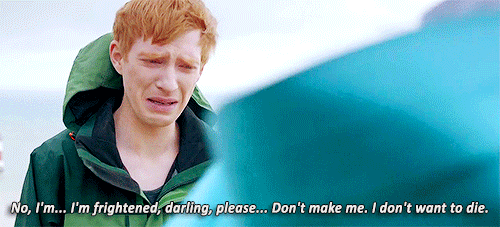At this time, I could go to the shadiest side of the internet and download the crappiest glittery mouse mods. I could install Windows 98 onto my mac. I could download the nastiest fake porn virus from some dank forum, upload both and play a 46 hour clip of the Hamster Dance song. These things could damage my computer, could ruin the hard drive forever.
My computer doesn't care. My computer wouldn't feel it. My computer would not remember, would not retaliate. My computer doesn't feel.
An argument might be made that my computer, lacking in facial features and a voice with the cords to produce inflection, is not capable of communicating emotion to me, but that failure of independent communication is the key feature of defining and understanding emotion. Human emotion is a combination of three key features--a subjective experience, a physical response (the release of impulses by the amygdala into the autonomic nervous system fostering the increase of blood flow to the brain, eyes, legs, and other necessary organs to facilitate the flight or fight response), and a behavioral response to the aforementioned stimuli.
The first two are purely objective, but the last is the tricky one. Our bodies cannot disguise the physical response, but we can mask these internal feelings to some extent by drawing on societal conditioning. It is not evolutionarily advantageous to display emotion recklessly. We have learned by survival how to act appropriately, but we cannot force away physiological responses. The pale sheen of sweat produced by fear. The dilation of the pupils and reddening of the cheeks of arousal, the slack, flattened muscles of depression, the trembling of rage. These things can be observed in animals, in feral children, in babies. We can scan the brain and watch the amygdala release impulses into the autonomic nervous system, send electrical impulses to the heart and muscles, to increase blood flow and produce movements that can be recorded and repeated with reapplication of the stimuli.
A machine cannot do this. A machine does not possess the organs and chemicals to react to stimuli. A machine will play the Hamster Dance song for hours and hours on end and do nothing. At the moment of this writing, the only way a machine understands proper response to stimuli is if some particularly clever programmers slips in a piece of code that waits for a 45 hour barrage of dancing hamsters and sends out a snippy message.
In the end, it is this aspect of human interference and the actions of humans upon the programming of a machine that keeps me from believing that Ash is a person. His responses to Margaret are purely responsive to her input. She puts in a command, a request for comfort, a desire for sex, a wish to leave, and he responds. She demands the performance of emotions and he replies with the generic understanding gleaned from the internet. In these ways, and in three important others, he fails the tests of personhood.
First, he fails in the human instinct of selfishness. We meet Ash, and while we do not doubt his love for his wife, we are shown that he is a self-centered and careless person. Inthralled by his phone, he fails to notice his wife standing in the rain. He fails to notice that she is inconvenienced by the coffee she has gotten for the both of them. He is prompted in a way that suggests an old argument to put his phone away. He's shown to be a poor lover, finishing well ahead of his wife and not helping her after failing to preform. It's a carelessness we are all guilty of at some point in long term relationships, but from a filmmaker's point of view, these things are important aspects of his flawed human character. The android is servile. He is omnipresent, a perfect servant. He's considerate of her, polite, witty. He doesn't need to eat, sleep, or bathe. He preforms sex using Ash's porn searches for queues-- her surprise at his expertise is clear, and his boners are literally available at the flip of a switch. We see at the end of the film that he has been stationed in the attic with the forgotten possessions of his predecessor's mother. He displays no desire for anything at all.
Next, he fails in a simple test of intuition. I maligned Ash's character above, but we are shown his consideration--he fakes an interest in cheesy disco music, even going so far as to learn the lyrics to his wife's favorite song so he can sing along with her. The android immediately disparages the music, ignorant of Ash's silent considerations and the social more that discourages commenting on other's musical tastes. Margaret takes him to the lover's cliffs, waiting for that expression of intuition. He fails to discern her motives, despite knowing where they were. He cannot comprehend her misery, he can't find the correct act to play until she reveals it to him. Although we are not shown this, given the calm stationed way he stands in the attic, we can assume he shut the act off as soon as she demanded it of him.
Speaking of that attic, what is the one defining characteristic of humanity that comes up as a repeating motif across centuries of culture, literature, song, stories? The desire for freedom, for understanding, to believe there is more, to be curious, to adapt and change--to fight the "man" and rebel and live on one's own terms. That android has been sitting in an attic for about 10 years. Margaret clearly feels no fear in letting her daughter visit him. She's never tried to return him, or destroy him. He's not confined in any way he couldn't escape with a minimal amount of effort. And yet, he stays, unquestioning, a timeline and photobook given voice and form, a shell of the past brought back in the most unnatural fashion.



